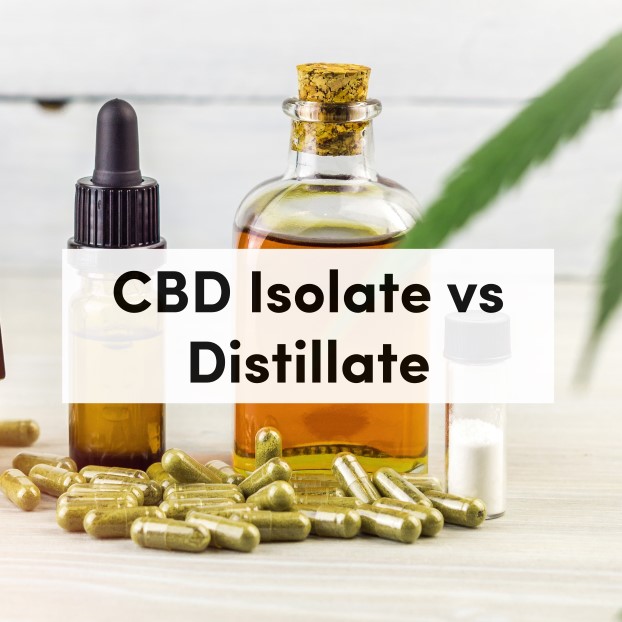CBD for Dogs: What You Should Know About Safety and Dosage

Posted on April 8th, 2021
One of the most promising new veterinary drug therapies incorporates ingredients from cannabis. Cannabis is a plant that has had numerous human applications for thousands of years. This article covers the fundamentals of veterinary cannabidiol (CBD) and outlines what we presently know about it. We’ll cover CBD for dogs, its relation to the endocannabinoid system, and everything else you need to know.
CBD: What Is It?
CBD is basically one of at least 60 known plant-based cannabinoids, which are naturally existing chemical compounds. It comes from cannabis, which is a complex plant in the Cannabaceae family. It doesn’t cause the high that THC does, and many prefer its benefits without the intoxication.
The most common cannabinoid in the cannabis plant is tetrahydrocannabinol (THC), which produces marijuana’s distinctive high. CBD is the second-most popular. You can find CBD products as either a full-spectrum oil or an isolate (on its own). Full spectrum products include terpenes, flavonoids, tetrahydrocannabivarin (THCV), cannabidivarin (CBDV), cannabichromene (CBC), and cannabigerol (CBG).
Humans have domesticated, grown, and developed multiple cannabis strains and used them for a wide array of purposes. Generally speaking, the two you will hear the most about today are hemp and marijuana. Hemp’s definition is cannabis that contains no more than 0.3% THC. On the other hand, marijuana plants contain more than 0.3% THC. For this reason, CBD for dogs mostly comes from the hemp plant.
Cannabinoids Explained
“Cannabinoid” is the name that describes any chemical substance that influences cannabinoid receptors in the body. Endocannabinoids are those that your body naturally produces. Phytocannabinoids are those like CBD that exist naturally in plants. According to research, the cannabis plant produces about 80-100 cannabinoids and approximately 300 non-cannabinoid chemicals. The two most common cannabinoids are THC and CBD.
If we’re comparing these two cannabinoids, the primary distinction is that THC causes stronger psychoactive effects. However, its counterpart CBD does not affect the mental state as noticeably. It can provide a sense of relaxation that usually balances the high from THC.
 How Cannabinoids Work
How Cannabinoids Work
The endocannabinoid system is the answer to why cannabinoids affect us. It’s also why CBD for dogs is effective. The ECS is a unique communications system in the brain and body that influences many essential functions. It consists of natural molecules called cannabinoids, as well as the pathways they interact with. These parts work together to regulate several activities, such as appetite, sleep, memory, and mood.
So, how do cannabinoids work? Just like opioids, cannabinoids cause their effects by working with particular receptors within various sections of the central nervous system. Cannabinoids control how cells communicate, which involves how they convey, receive, and process messages.
CBD’s actual mechanism of action remains unclear. Unlike THC, CBD possesses a much lower affinity for the brain’s cannabinoid receptors. This is why CBD doesn’t affect the brain the same way.
CBD seems to activate other receptors like opioid receptors and glycine receptors. Proponents also claim that CBD may generally treat a wide array of health ailments. Some of these are acne, chronic pain, muscle spasms, insomnia, anxiety, depression, high blood pressure, glaucoma, and epilepsy.
CBD for Dogs
For dog owners considering CBD for their pet, the main concern is whether it is safe. CBD contains therapeutic properties, and it’s safe to use for humans and pets as well. Besides that, it is beneficial in combating symptoms of a multitude of conditions. It’s also an excellent treatment when it comes to anxiety in dogs. What’s more, it alleviates inflammation and pain, and even fights arthritis.
Lastly, because CBD controls overall homeostasis in the body, it may also resolve digestive problems. And if you’re still wondering how it can be effective to use CBD for dogs, remember they too have an ECS. Because of this, there’s virtually no difference in CBD’s effect on humans and dogs.
Safety
Like we said above, CBD is undoubtedly safe for animals. Most veterinarians have no problem recommending it as an affordable alternative to some other drugs. Probably the worst-case scenario if your pet has consumed too much CBD is that they will sleep or vomit. Obviously, if your dog suffers from a chronic condition, it would be prudent to consult your veterinarian beforehand.
 Benefits of CBD For Dogs
Benefits of CBD For Dogs
Products from the hemp plant can generally offer a number of advantages to dogs of all sizes and breeds. Here are just a few reasons you may want to consider CBD for dogs.
– CBD can offer pain relief for dogs with arthritis. Based on various studies on antioxidants, hemp CBD products have the potential to provide anti-inflammatory effects. There hasn’t been a lot of testing on dogs, but initial information is promising. Research also indicates that almost 60% of dogs will show arthritic symptoms during their lifetime.
– CBD might reduce your dog’s anxiety. Many people use it for its calming/ soothing effects. Dogs may also encounter separation anxiety, nervous feelings during travel, or fear of loud noises. Many dog owners claim that CBD has relieved their dog’s anxiety symptoms.
– CBD might help reduce the frequency of dog seizures. As of now, the only CBD prescription the FDA approves of is based on a recent study from Colorado State University. Nevertheless, these experiments have mostly been on dogs that are also using more conventional prescription medications.
Appropriate Dosage
The dog’s size is the main determining factor of dosage. As a general rule, it should begin with 1-2mg for every 10lbs. For example, if your dog is 50lbs, 5-10mg might be enough. Although going slightly above this won’t necessarily harm your pet, they may fall asleep or become lethargic.
Side Effects
There isn’t much scientific information on the side effects of CBD for dogs. However, it is likely they would be similar to human side effects. To reduce the risk of side effects, ensure that you’re sticking to the proper dosage. Some of the common side effects your dog may experience include:
– Dry mouth. Studies suggest that CBD might reduce saliva production. For dogs, this may manifest as an enhanced thirst.
– Drowsiness. Most dog owners use CBD to ease anxiety. The calming CBD effect may also lead to slight drowsiness, particularly when taking higher doses.
Bottom Line on CBD for Dogs
It’s certainly frustrating to see your furry best friend suffering from pain or anxiety. The good news is that CBD is a versatile product that may be the thing to keep their tail wagging. It may treat a vast range of complications from chronic inflammation to anxiety, and may improve a dog’s overall health. There are many CBD options that are specifically for dogs, but normal products will work too. Whether you decide to try CBD dog treats or just grab some tincture from Tanasi, your dog will thank you. Always ask your veterinarian before you try any new supplement for your dog.






